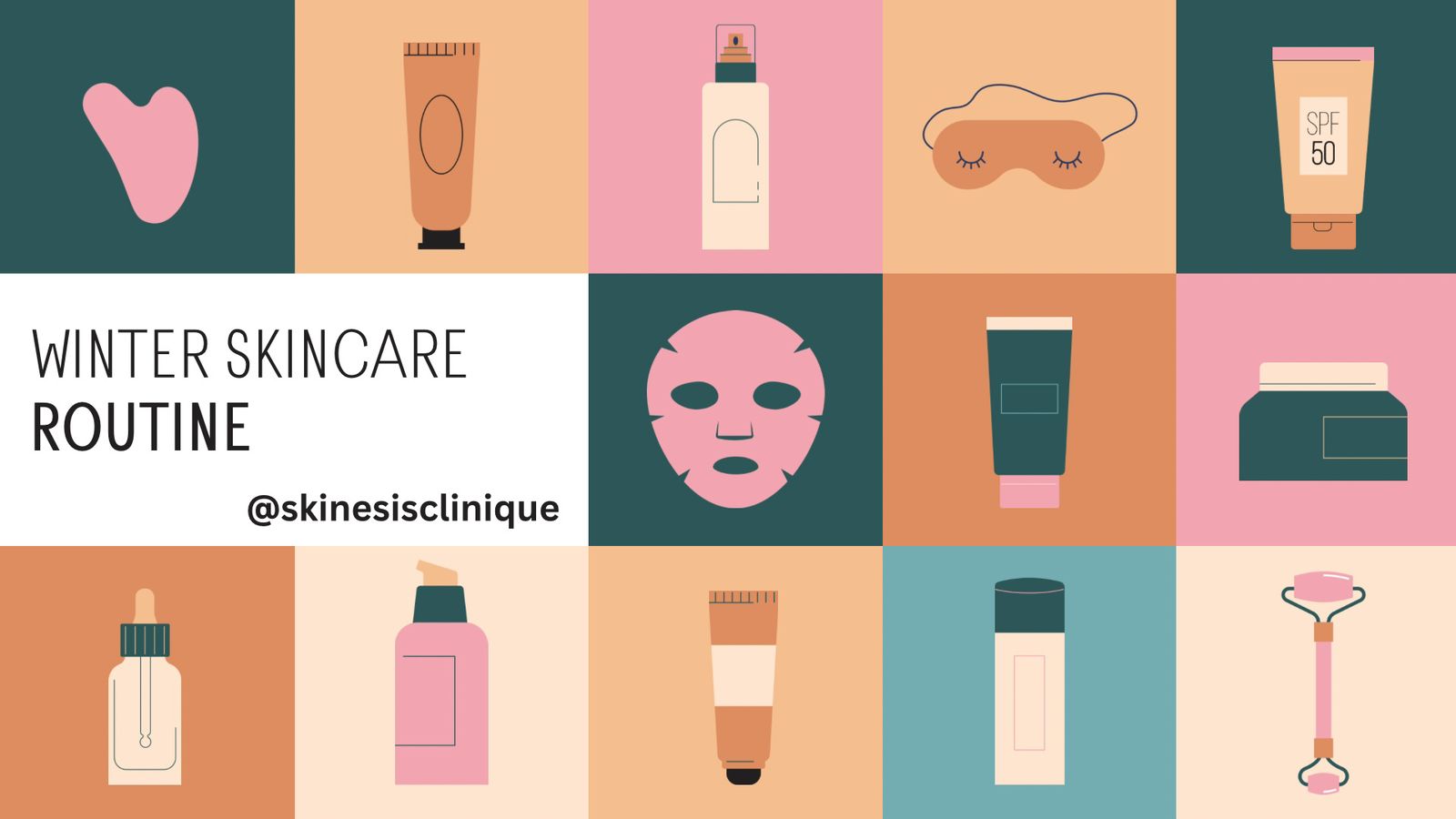
It’s important to take additional care of your skin during the cold winter months. Your skin may suffer from dryness, flakiness, itching, and even skin disorders like eczema as a result of the cold, low humidity, and indoor heating. Establishing a winter skincare regimen that takes into account your skin’s unique requirements during this season is crucial to preventing these issues. This blog post will discuss eleven essential winter skincare products that can help you keep your skin looking radiant and healthy all winter long. Now let’s get started and find out which items are essential for your everyday skin care regimen at home in the winter!
What is my Skin Type?
Although there isn’t a single, universal method for getting glowing skin, knowing your skin type might help you choose the most tailored strategy. In essence, “skin type” refers to a collection of defining traits that characterize the way your skin typically feels and looks.
The amount of sebum (oil) your skin generates determines your skin type. While aging, humidity, stress, and hormones are some of the elements that can affect this, heredity plays a major role. “Your skin [type] can change over time,”
“Your Skin (Type) can change over time, Some people may find that their skin becomes less oily as they age or in certain environments and humidities.” – Suggested by the Dermatologists at Skinesis Clinique, Vasant Vihar New Delhi.
Oily Skin
According to a skin specialist at the Skinesis Clinique in Vasant Vihar, New Delhi, “oily skin is caused by the [skin’s] sebaceous glands producing too much sebum.” “Genetics, stress, humidity, and even changing hormones can cause this.” Your face may seem oily and greasy if your skin generates too much sebum, especially in the T-zone (forehead, nose, and chin). Large pores, blackheads, and other acne problems are common in oily skin because too much sebum can block your pores. There may be a benefit to having oily skin, though. People with oily skin may have less wrinkles, according to the American Academy of Dermatology.
Dry Skin
Sebum production is typically lower on dry skin than on other skin types. Sebum is essential for lubricating and shielding your skin from moisture loss. Your skin may appear noticeably dry, lifeless, flaky, or even scaly if you don’t have enough natural oils in your body. It frequently has a rough texture, feels tight, and has more noticeable fine wrinkles. Additionally, dry skin might get sensitive or irritating. A dermatologist at the Skinesis Clinique in Vasant Vihar, New Delhi, claims that drying products and long, hot showers might exacerbate dryness.
Combination Skin
“Having combination skin means that certain parts of your face are more oily and other parts are dry.” The T-zone (forehead, nose, and chin) is frequently oily and the cheeks are frequently drier in those with combo skin.Each person with combination skin will have a different appearance. Some may have red spots in drier regions, while others may see shine in areas where they typically have more oil.
Dry spots may also appear yellowish (often called ashy skin) depending on your skin tone. The mixed skin type may be more prone to change with the seasons or as a result of a number of variables, including hormone changes or stress.
Normal Skin
Simply said, having normal skin implies that it feels comfortable and nourished without being dry or oily. Individuals with normal skin do not have dry and oily patches, in contrast to those with mixture skin. The skin doctor continues, “They just look comfortable and hydrated overall.” Generally speaking, normal skin types are not susceptible to any particular skin issues, such as shine, redness, or acne outbreaks. In addition to having smoother skin with less obvious pores, those with normal skin may also be less sensitive.
Sensitive Skin
The only skin type that isn’t influenced by the amount of oil your skin generates is sensitive skin. Rather, skin that is more reactive than other skin types is referred to as sensitive skin. Certain components (like smell) and environmental variables (like pollution) can readily trigger sensitive skin, making it more susceptible to external irritants. After using skincare products, people with sensitive skin may experience redness, stinging, burning, or irritation. Even though it’s typically categorized as a separate skin type, sensitivity can occur in any of the other skin types. Although the precise origin of sensitive skin is still unknown, new study indicates that a weakened skin barrier may be a contributing factor.
Winter Skincare Routine
Hydrating Cleanser
A moisturising cleanser that cleanses your face gently without drying it out is an essential part of your winter skin care routine. Hydrating cleansers are made to eliminate dust, debris, and excess oil while preserving their moisture balance, in contrast to ordinary cleansers that can remove natural oils. Using a moisturizing cleanser twice a day, in the morning and the evening, would be ideal. Additionally, to prevent additional skin dryness, rinse your face with lukewarm water rather than hot.
Moisturiser with Deep Hydration
It is impossible to overestimate the importance of a moisturizer in your winter skin care regimen. A moisturizer serves as your skin’s barrier of defense. The purpose of a deep hydration moisturizer is to restore and nourish the moisture in your skin.You must cleanse and tone your skin before applying your moisturizer twice a day for optimal moisturization.
Exfoliation
Exfoliators function by encouraging cell turnover, clearing clogged pores, and eliminating dead skin cells. Your daily skin care routine at home can benefit greatly from the inclusion of gentle exfoliators made of natural substances like sugar or oatmeal.
Sunscreen
During the colder months, the sun may not feel as intense, but damaging UV rays can still cause skin damage. Sunscreen helps shield your skin from harmful rays, preventing dark spots, skin cancer, and premature aging. To protect yourself from UVA and UVB radiation, you can use a broad-spectrum sunscreen with at least SPF 30.
Hand Cream
Hands are frequently exposed to severe weather conditions during the winter, which can cause them to become dry and cracked. At this point, using a hand cream is crucial for wintertime skin care. A excellent hand lotion that contains glycerin or shea butter can serve as a barrier to keep moisture in and stop hands from drying out. Make sure to massage it well into your skin, focusing on the spaces between your fingers and the backs of your hands, for optimal results.
Balm for the lips
During the winter, chapped and dry lips are a common issue. Throughout the winter months, you may maintain the softness and suppleness of your lips by using a high-quality lip balm that contains natural ingredients like beeswax, shea butter, or coconut oil.
Eye Gel/Cream
Wintertime calls for extra care for the sensitive skin around your eyes. During this time of year, dark circles and puffiness around the eyes are common concerns. Applying an eye cream or gel that contains caffeine and vitamin C will help increase blood circulation and reduce inflammation, which will lessen the look of puffiness and dark circles under the eyes.
Vitamin E or Hyaluronic Acid Serum
Throughout the winter, you may avoid severe dryness and maintain a healthy, radiant complexion by incorporating a hyaluronic acid/vitamin E serum into your regular skincare routine at home. As a humectant, hyaluronic acid draws moisture to the skin and keeps it from becoming dry. Conversely, vitamin E is a strong antioxidant that lowers inflammation and shields your skin from free radicals. Your face should be cleansed and toned before applying the serum.
Overnight Hydrating Mask or Night Cream
By adding a night cream or an overnight moisturizing mask to your winter skin care regimen, you can give your skin extra attention and nourishment. Hydrating masks and night creams are specially made to repair the skin barrier and replenish moisture. By giving your skin significant moisture and hydration while you sleep, these products do miracles.
A well-balanced diet
A healthy diet nourishes your skin from the inside out, while all of the things mentioned above act on the outside. Antioxidant-rich foods, such fruits, vegetables, and nuts, can thus be a fantastic addition to your diet for winter skin care because they help fight free radicals. Omega-3 fatty acids, which are included in fish and flaxseeds, can also be included because of their anti-inflammatory qualities, which are good for the skin.
Takeaway
In order to protect your skin from the cold and dry weather, you will need to use a few more items during the winter. Dryness and other skin problems can be avoided by include essential items in your winter skincare routine, such as a hydrating moisturiser, lip balm, hand cream, sunscreen, etc. Even in the harsh winter months, you may have glowing skin with regular care and attention.
Please note, The above recommendations are by the Dermatologist at Skinesis Clinique, Vasant Vihar and suggest you to consult us at 7011939438 for any queries related to your customised skincare routine.


